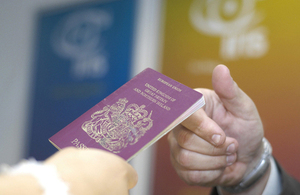Scottish independence: Analysis paper on borders and citizenship published
Government paper sets out possible impacts of an international border being created in the event of a vote for Scottish independence.

Common UK citizenship and the unrestricted movement of people and goods between Scotland and other parts of the UK have been crucial in enabling the integration of communities and businesses, the government’s latest Scotland analysis paper concludes.
The Home Office paper, ‘Scotland analysis: Borders and citizenship’, is the tenth in the UK government’s analysis series. It examines the challenges an independent Scotland could face in taking control of its borders, and sets out the difficult choices about citizenship that a yes vote would mean for people in Scotland.
Minister for Immigration Mark Harper said:
The principles addressed in this paper are fundamental to how we define ourselves: our nationality, the border that protects us and the passport we use to travel the world.
There are no easy answers to the question of what could happen if Scotland goes it alone. There would be a new international border and – however close our cooperation – that could mean more bureaucracy and extra controls for people travelling to visit family, go on holiday or do business.
It would also be an unprecedented experiment with nationality and identity that would reverse centuries of common UK citizenship. It would affect not just millions of people today but also generations to come.
The paper stresses that management of the UK’s external border is complex, expensive and relies on a fully integrated system across the UK. Currently, all activity to manage, control and secure the UK’s border, and every penny spent, benefits each UK citizen wherever they live or work.
However, should Scotland vote for independence, the current boundary between Scotland and the rest of the UK would become an international border between two separate countries.
The analysis also considers the implications of independence for citizenship. If Scotland became an independent state, its new government would decide who would be able to become, or be required to become, a Scottish citizen. This decision would have profound implications affecting not only those who vote in the referendum but also their children and grandchildren.